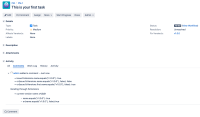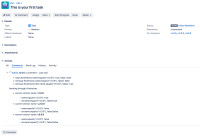-
Type:
Bug
-
Resolution: Not a bug
-
Priority:
Low
-
None
-
Affects Version/s: 7.4.2
-
Component/s: Smart-values
-
None
-
Severity 3 - Minor
Issue Summary
When using the OR smart values on the Fix Version field, it doesn't return the right results.
This is reproducible on Data Center: (yes)
Steps to Reproduce
- Create a new issue and add the Version 1.0 value to the Fix Version field.
- Create a new Automation rule with "Manually triggered" and add the "Edit Issue" on the action.
- Choose to update the Description field with the syntax below.
- Paste the smart syntax in the rule actions:
* issue.fixVersions.name.equals("Version 1.0"): {{issue.fixVersions.name.equals("Version 1.0")}} * or(issue.fixVersions.name.equals("Version 1.0"), false): {{or(issue.fixVersions.name.equals("Version 1.0"), false)}} * or(issue.fixVersions.first.name.equals("Version 1.0"), false): {{or(issue.fixVersions.first.name.equals("Version 1.0"), false)}}
- Publish the changes.
- The results we get is this:

Expected Results
Based on the OR logic:
or(issue.fixVersions.name.equals("Version 1.0"), false)
When comparing true or false, we should get true instead of false.
Actual Results
The results returned false instead comparing true OR false logic.
Workaround
Add a .first syntax:
or(issue.fixVersions.first.name.equals("Version 1.0"), false)
- relates to
-
A4J-3005 Loading...


